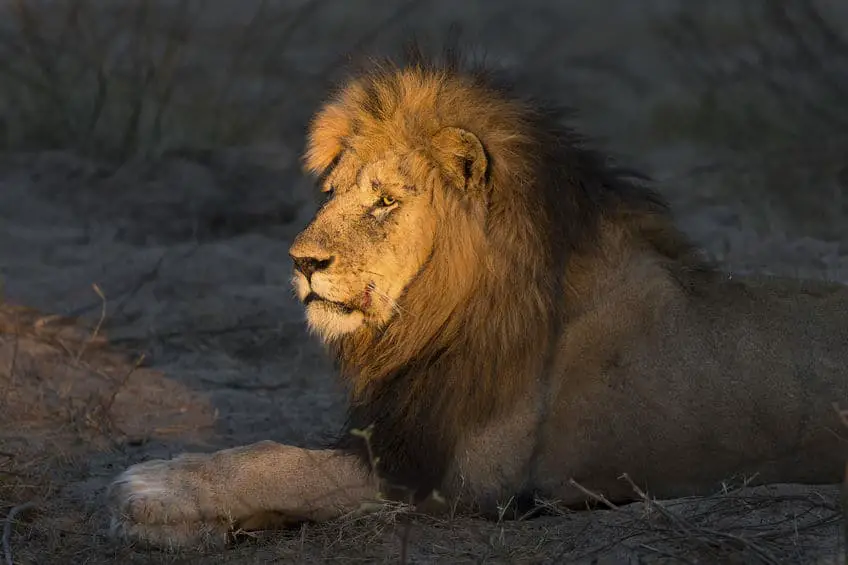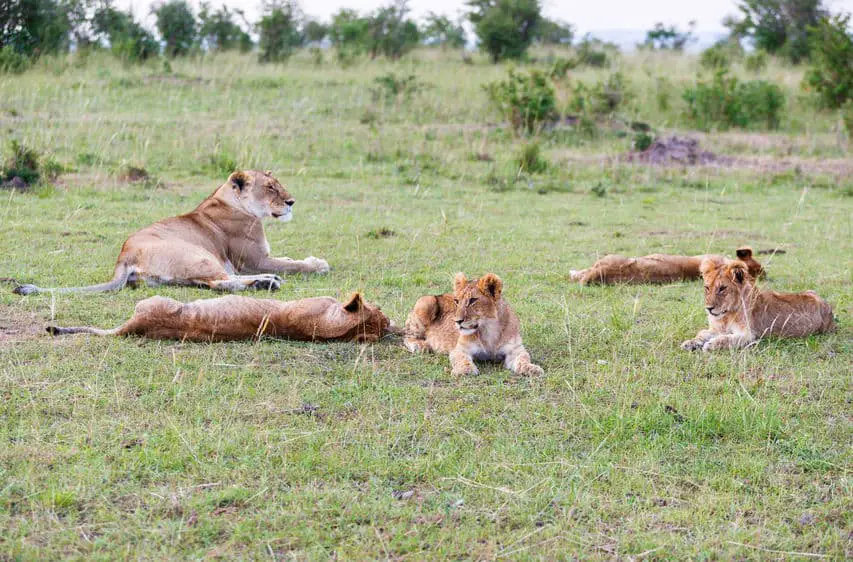
The majestic lion is without a doubt one of the most incredible sightings you can have on your African Safari. You may have heard that the lion is nocturnal but the full answer is a bit more detailed.
Are lions nocturnal? The African lion is considered to be nocturnal but many sources also categorize it as crepuscular. This means that the lion is active primarily in the twilight period which is the time period between dawn and sunrise or between sunset and dusk.
Lions are generally known to sleep much and be active in the colder hours of the day and while this is mostly correct, there are several fascinating details about this that you might find interesting.
Why Are Lions Active at Night?
Like other large African cats, lions are primarily active in the very early or very late hours of the day and are often seen resting or sleeping under trees or bushes where they like to enjoy a cold spot in the shadow.
There are several reasons why lions spend most of the day resting or sleeping and why they do most of their hunting during the twilight period.
While reading about lions and doing research for this post, I learned some fascinating things about the large majestic cats and about why their hunting and resting schedules are the way they are.
One advantage the lion gains from being nocturnal (or crepuscular) is that most of its prey is primarily active during the day and more passive during the very early or the very late hours of the day, which is exactly when the lions are active and do most of their hunting. This gives the lion an advantage as it makes catching prey easier and less energy-consuming.
In addition to this, many antelopes store heat in their bodies during the day and release it at night when it gets colder. When the antelopes do this, they do not have as much endurance and are not able to run as fast which also makes them easier targets for hungry lions.
Yet another thing that makes hunting at night much easier and effective for lions is their superior vision. Lions have excellent eyesight in low-light conditions which gives them a huge advantage over most of their prey such as gazelles, antelopes, and zebras who do not have as good eyesight at night.
So if you want to increase your chances of seeing lions being active and perhaps even hunting, you should aim to be out on your game drive during sunrise or sunset.
Clearly, lions gain a number of advantages over their prey by being nocturnal but that does not mean that they are only active at night. Far from it.
What Time of the Day Are Lions Most Active?
As we just learned, lions are nocturnal or crepuscular mammals and are primarily active in the darker, cooler hours of the day but even though lions are considered to be nocturnal, they can definitely still be active during the day.
I have found some interesting facts about when and why lions can also be active during the day as well as some tricks to increase your chances of spotting them in daylight.
Lions tend to be more active on cooler days than on warm, sunny days so if you wake up to cold and cloudy weather on your safari, then you could try to utilize this by going out on a game drive and see if you can spot some lions or other large African cats.
As I already mentioned, lions tend to be less active on warm, sunny days but they can definitely still be spotted. On these days it can pay off to look for lions resting in the shadow under trees or bushes.
In addition to this, lions like to rest near waterholes. Especially on warm, sunny days.
Waterholes tend to attract all kinds of different wildlife such as antelopes, zebras, giraffes, and buffalos, and should one of them get too close to a resting pride of lions, the lions might very well interrupt their nap for an easy meal.
How Much Do Lions Sleep?
Lions are known to sleep for the majority of the day and while this is mostly true, I have learned some interesting details about this that I will share here.
Male lions actually often get to sleep or rest for several hours more than the female lions.
Male lions sleep for around 18-20 hours per day and female lions sleep for around 15-18 hours per day.
I have actually even found sources claiming that lions can sleep up to as much as 22 hours a day.
The reason why male lions get to sleep more than the females is that the lionesses usually spend more time hunting and taking care of cubs than the male lions.

Are Lions Lazy?
You might have heard that lions have gotten a reputation for being lazy and as I just covered, they sure do spend a lot of time sleeping or resting but there are very good reasons for this and laziness is far from one of them.
One of the reasons why lions are idle most of the day and why they are often seen sleeping or resting in the shadow of a tree is that they are preserving their energy and saving it for the cooler hours in the evening or early morning. This preserved energy comes in handy when it is time to hunt prey.
Lions are generally very fast animals. They can run 50 mph (80 km/h) which is about twice as fast as the fastest humans can run.
Despite being able to run very fast, lions are actually slower than much of their prey which is why lions often rely on the element of surprise when it comes to hunting.
When hunting, lions often either simply lay still or sneak up on their prey slowly and quietly before striking for the ambush. This has nothing to do with laziness and everything to do with efficiency as it gives the lion an advantage over the unsuspecting prey and will often result in a successful hunt.
In conclusion
Lions are considered nocturnal or crepuscular animals as they are active primarily at night or during the very early or very late hours of the day.
There are several reasons for the lion being nocturnal or crepuscular, including that the lion preserves its energy during the day, allowing it to hunt more efficiently in the darker, cooler hours of the day. During these periods of the day, most of the animals hunted by the lion such as gazelles, antelopes, and zebras have less energy as they are active primarily during the light and warm hours of the day. For this reason, they have less endurance and are not as fast in the evening which makes it easier for lions to catch them.
Despite lions being nocturnal or crepuscular, they can still be seen during the day. They often rest or sleep in the shadow of trees and bushes near waterholes but can also be seen hunting if the right opportunity strikes. Additionally, lions are also known to be more active on colder, cloudier days than on warm, sunny days.
So to improve your chances of spotting the mighty lion on your safari, go on game drives during the very early or the very late hours of the day or try your luck on cooler, cloudy days. And remember to keep an eye on the ground below trees or bushes as lions like to take advantage of the cool shadow provided by these.

